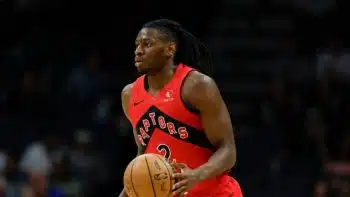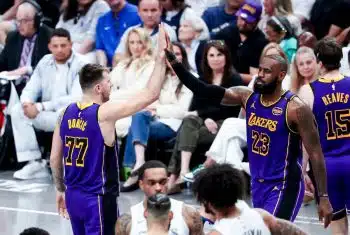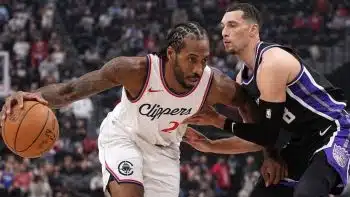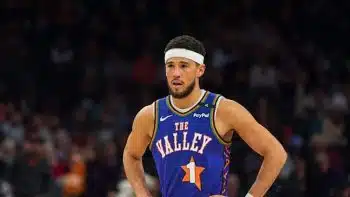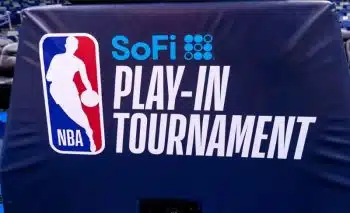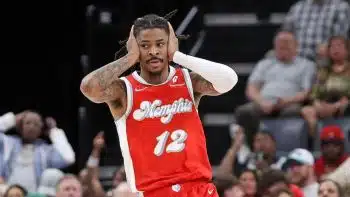NBA
NBA Daily: Deadline Dilemma In Toronto
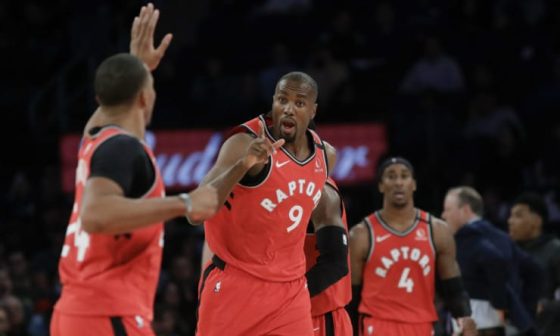
The Raptors have overachieved in a ridiculous way in 2019-20. They were +700 to repeat as NBA champions prior to the 2019 free agency period, according to the Draft Kings.
Immediately after Kawhi Leonard fled West, the Raptors’ odds grew to +2200 to repeat – tied with the Celtics, who just lost Kyrie Irving, and the Nets, whose best player was set to miss the entire year. And yet through 44 games, the Raptors are third in the Eastern Conference with a 31-14 record and only one-and-a-half games behind last year’s pace (32-12).
But what’s in a record? There’s more to unpack than just wins and losses, especially when success has almost certainly been redefined in a city that just experienced its first NBA championship ever. So a logical test is how well you’re playing against the crème de la crème. And in that regard, the Raptors haven’t fared too well. Including their home win against Philadelphia on Wednesday night, the Raptors are still only 7-12 against winning teams with a net rating of minus-37 in those 19 games.
Very few teams would be terribly upset to be in a similar situation as the Raptors. In fact, most teams would be thrilled to be third overall in their conference. But the Raptors are barreling toward an interesting decision: embrace the opportunity to continue to gain playoff experience (and additional playoff revenue) or expedite a miniature rebuild. This writer’s thoughts on the matter are well documented in our 2019-20 Toronto Raptors Season Preview and our recent Atlantic Division – buyers or sellers piece. But let’s officially build a case supporting the Raptors trading some of their veterans in an attempt to add assets prior to the Feb. 6 trade deadline.
The Raptors’ most valuable trade chip is also their longest-tenured player – starting point guard, Kyle Lowry. Lowry is 33 years old and experiencing a career resurgence after taking a back seat to Leonard last year. Lowry is averaging a near career-high 37.1 minutes per game, in which time he’s scoring 20 points per game – more than he’s scored since 2016-17 — and dishing out 7.5 assists.
But Lowry is probably the last guy the team wants to move. He’s a fan favorite and has been with the team for eight consecutive seasons; Lowry is currently third overall for games played in franchise history. But if they chose to dangle Lowry on the trade market, they would certainly get a good amount of interest from teams like the Lakers, HEAT, 76ers and maybe even the Jazz and Nuggets. What interested parties would offer is an entirely different story, but it would have to be pretty aggressive to get the Raptors to part with their franchise player.
But there are other guys who make more sense in a trade.
There’s Marc Gasol, their soon-to-be 35-year-old center. Unlike Lowry, Gasol is not experiencing a career renaissance. He’s missed 12 of their 44 games, with down years in scoring (7.8 points per game compared to his 14.7 career average), two-point shooting (44% compared to his from 49.7% career average) and rebounds (6.4 rebounds compared to his 7.6. career average). But he still has a good amount of utility in him. After all, he leads the Raptors in defensive plus/minus, per Basketball Reference – something that he’s prided himself on throughout his career and an attribute that would be a welcomed addition to most contenders.
There’s also Serge Ibaka, their 30-year-old sometimes-starting, sometimes-backup big man. Ibaka is actually outpacing career averages in scoring (14.9), rebounds (8.4) and assists (1.3). Ibaka is still widely viewed as an above-average and versatile defender, and the fact that he’s shooting 37% on three-pointers makes him all the more valuable to teams like the Boston Celtics – who lack a true big man who can stretch the floor.
Gasol and Ibaka’s standing in Toronto is especially vulnerable since both will enter free agency this summer — whereas Lowry signed an extension last year that runs through 2020-21, when he’ll make $30.5 million. The Raptors could choose to keep Gasol and/or Ibaka, but either or both could walk without returning any assets as soon as this July. Further, the team is unlikely to break the bank for either considering they’ll have to make a generous offer to retain soon-to-be free agent guard Fred VanVleet – who is having a breakout season, averaging 18.7 points and 6.7 assists per game while shooting 38.8% on a career-high 6.9 three-point attempts per game. VanVleet is only 25 years old and fits alongside Pascal Siakam, OG Anunoby and the team’s young role players like Norman Powell far better than Ibaka or Gasol.
As it stands, the Raptors have about $85 million in salary commitments for 2020-21 with $3.8 million in a player option (Stanley Johnson) and another $1.5 million in a team option (Terence Davis). The cap is projected at $116 million with the luxury tax kicking in at $141 million. They can (and should) invest between $20 and $25 million per year in VanVleet, which brings them up to about $110 million. If negotiations begin creeping north of $25 million per year, the Raptors will have to make concessions elsewhere if they hope to retain VanVleet – Ibaka would theoretically be among those concessions since he’ll probably be looking for at least one more generous payday. It’s unclear what Gasol would seek in a new contract.
All three of the aforementioned Raptors have at least one thing in common – they are the only three Raptors born before 1990. So whether they like it or not, the Raptors have turned their roster over quickly and effectively to the extent that they have a talented young core with the framework of a contender in the making.
All three veteran players can definitely continue contributing for at least the remainder of this season – and to varying degrees, well beyond it. But their impact will be more profound on a contender looking to add quality veterans. And despite what their record tells us, that’s just not the Raptors right now.
Instead, the Raptors are a team in the very fortunate position of being able to reload relatively quickly around a blossoming young core. Yes, they’re significantly better than average, but which would you prefer: a team that qualifies for the conference semifinals in 2019-20 or a team that loses in the first round of the 2019-20 playoffs, but adds additional assets — some of whom help the team remain competitive for years to come?
Granted, dislodging Lowry from Toronto requires a monster offer and would result in at least some backlash; but neglecting to trade Gasol and/or Ibaka is likely to result in one or both leaving to pursue more money and/or additional championships – neither of which can the Raptors offer. The Raptors and team president Masai Ujiri have made bold moves time and again. There is no reason to hold off on moving either Gasol and/or Ibaka before Feb. 6 – and if a sweetheart offer comes in for Lowry, then him, too.
Regardless, the Raptors are fairly well set up for the future, so it is unlikely that this move (or lack of it) is analyzed too aggressively in the future. And also, there is certainly a fine line between being opportunist and greedy. But trading one, both or all veterans allows the team to add additional assets to a cupboard that already looks pretty well stocked.
And it’s probably one of the final opportunities to add talent before their core takes its final form — and if that form results in future championships is partially dependent on how the Raptors proceed before the 2020 trade deadline.
